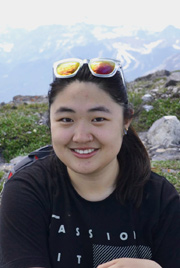From one NCC intern to another
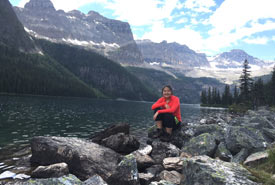
Bourgeau Lake in Banff National Park (Photo by Sophia Yang/NCC)
One of the main reasons why working for the Nature Conservancy of Canada (NCC) is so rewarding is because of all the wonderful people that make the work possible. At the forefront are NCC’s interns.
Whether it’s spending days at a time in the field conducting field work, organizing Conservation Volunteers (CV) events or producing interesting content for the NCC website and Land Lines blog, NCC interns are dedicated, hardworking and humble. I got the chance to talk to two 2016 interns about their experiences from this past summer, and learned along the way how they’re making waves in the conservation field, one step at a time.
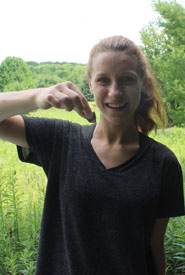
Stephanie Varty, 2016 conservation technician for NCC’s Happy Valley Forest (Photo by NCC)
Starting in central Canada, the first NCC intern I talked to was Stephanie Varty, who worked as a conservation technician in Ontario’s Happy Valley Forest. It wasn’t easy to get a hold of Stephanie since she was always doing hands-on work in the field, but I managed to catch her on the phone late one afternoon after she just returned from a garlic mustard removal event. Stephanie explained to me that garlic mustard is a super competitive invasive species that produces toxic chemicals that can kill other plants, so much of her summer has been focused on tackling this sucker.
Sophia (SY): What would you say has been the best moment from this past summer?
Stephanie Varty (SV): Because I get to work in the field a lot, species sightings are definitely my favourite part. Ontario had a really dry summer in 2016, so a lot of the amphibians and reptiles have been in hiding more. But in Happy Valley, Ontario, where I work, the eastern newt likes to forage around our trails after the rain. The coolest part is that in the juvenile stage, the eastern newt is bright red, known as a red eft, so it’s really easy to see because of how bright it is.
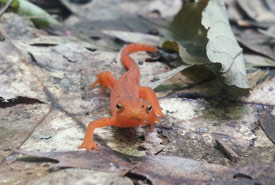
The red aft salamander is the eastern newt’s juvenile form, found at Ontario’s Happy Valley Forest. (Photo by NCC)
SY: Working for NCC often means that we have to balance out NCC's great stewardship with the human side of conservation, to engage our supporters and volunteers. As an NCC intern, how do you keep this balance?
SV: I think maintaining this balance is about being in the mindset. We have to remember that a lot of the stewardship activities we do would not be possible without people power. I had the chance to be a part of the Happy Valley Hike Series program this past summer, which is a pilot NCC program that provides guided hiking opportunities on various themes, such as bats, butterflies and botany. This has been really great since it’s a new way for us to introduce NCC to people, touching on scientific topics, but presented in a very social and dynamic manner. I had the chance to develop much of the Happy Valley Hike Series program, so I definitely have learned a lot about public engagement and strengthened my public speaking skills, while being able to do stewardship and conservation work in the field as well.
SY: How has NCC helped further your career or professional development goals?
SV: Having graduated from the University of Toronto earlier this year, NCC has provided me with a ton of hands-on experience that I wouldn’t have gotten otherwise. I had taken plant ID courses in school, but my plant ID skills have grown exponentially after this past summer. Due to my involvement in the Happy Valley Hike Series, I also realized how much I love sharing my passion for conservation with other people. Even though I graduated from school in September 2016, I’d love to work with NCC again in the future, as this past summer was very valuable and fun for me.
SY: Was there a really big learning curve for you this past summer?
SV: Absolutely, there were a couple of learning curves. Most of my work was located out of King City near the Happy Valley Forest, but my supervisor was located out of Peterborough, so a lot of coordination was needed. Jenna, the other conservation technician working with me over the summer, and I quickly learned that we had to be organized and efficient in everything we did, so getting used to protocols in the field has been a great learning process. Another cool learning experience was amphibian monitoring. It was my first time doing frog call identification, so I had to learn quickly. Jenna and I would go out late at night to listen to frog calls — it’s as fun as it sounds!
Following Stephanie’s interview, I interviewed Kate Williams, conservation volunteers program assistant for NCC in Alberta. I felt more at home interviewing Kate since she works in the same office as me, and I saw her smiling face every day. Having gone to two CV events with Kate and having camped together, I thought I knew some of her responses, but her answers pleasantly surprised me.
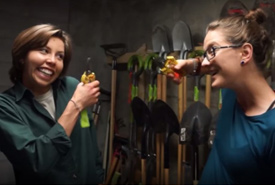
Kate Williams and Zoe Arnold (Photo by NCC)
SY: What would you say has been the best moment from this past summer?
Kate Williams (KW): The Alberta CV team (Kailey Setter, Zoe Arnold and I) were driving back after a successful barbed wire fence removal event near Chief Mountain, when we saw a moose run up the hill. We quickly pulled over to observe any other potential wildlife in the area, and weren’t disappointed! We later saw two sandhill cranes frolicking in the wild. It was so cool!
Advice for future interns
Working for NCC often means that we have to balance out the great stewardship work we do with the human side of conservation, to engage our supporters and volunteers. As you can see, both interns have very different answers for what they learned from this past summer, what surprised them and how NCC has been a valuable addition to their career. A couple of days after I sent my questions to the interns asking them to prepare their responses, I suddenly thought of another question to ask, and their responses might surprise you.
SY: What advice would you give to the next person coming into your role?
SV: Be sure to get acquainted with everything you will be working with. Don’t be afraid to ask questions! Curiosity sometimes gets a bad rep, but asking questions can be the most productive way to learn. In short, I would tell the next person: be organized and curious.
KW: Have fun and enjoy every moment. The summer season goes by so quickly, and there are so many CV events! It does get very busy, but if you’re having fun and being in the moment, it won’t feel like work at all. Be sure to ask lots of questions!

